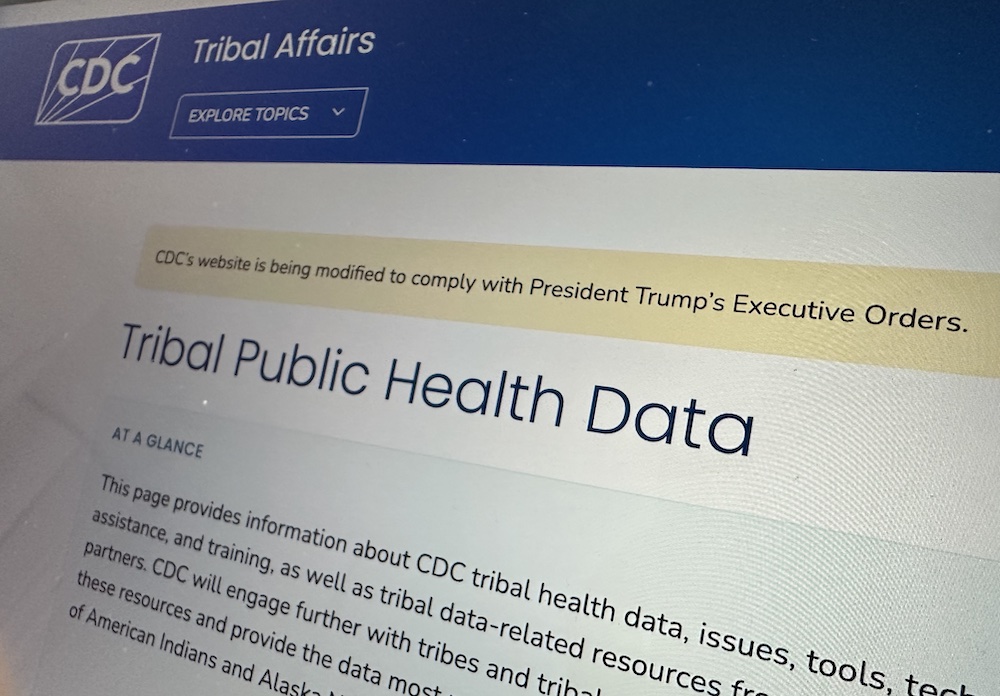
- Details
- By Elyse Wild
The Centers for Disease Control and Prevention (CDC) has stripped crucial health data from its website that tribal nations rely on to protect their citizens’ health, prompting immediate pushback from Native health leaders.
On Tuesday, the Seattle-based Urban Indian Health Institute (UIHI), which tracks health data for tribes and urban Indian communities, demanded the CDC immediately restore the information.
The removed data, which covers topics including gender, vaccines and climate change, disappeared from the CDC website between Jan. 31, and Feb. 4. UIHI leaders say this sudden removal violates federal obligations to share health information with tribes.
“The decision to remove essential public health data is a violation of treaty rights,” Abigail Echo-Hawk (Pawnee), executive director of UIHI, said in a statement. “As tribal public health authorities, tribes and (Tribal Epidemiology Centers) must have unrestricted access to public health data to fulfill our mission. The CDC’s actions undermine our ability to respond to urgent health crises that disproportionately impact American Indian and Alaska Native communities.”
UIHI serves as one of 12 Tribal Epidemiology Centers that track and respond to health issues affecting 574 federally recognized tribes, 41 urban Indian health organizations, and more than 9.7 million American Indians and Alaska Natives across the country.
Federal law requires the U.S. Department of Health and Human Services (HHS) to share health data with tribes and their health authorities. A 2022 report from the U.S. Government Accountability Office found that HHS failed to comply with the required data-sharing policies, which led to reforms to address these issues and uphold treaty and trust responsibilities.
Echo-Hawk said the CDC’s recent removal of public health data directly contradicts the tribal feedback that shaped these reforms and the federal government’s responsibilities to the tribes.
“UIHI stands with all public health experts and agencies that are demanding that CDC immediately restore access to these datasets,” Echo-Hawk said. “We also urge HHS to engage in meaningful government-to-government consultation with tribal nations to prevent future disruptions.”
The data removal has sparked legal action as well. On Feb. 4, Doctors for America (DFA), a nonpartisan organization representing over 27,000 physicians and medical trainees, filed a federal lawsuit against the CDC and four other federal agencies in a Washington D.C. district court. The lawsuit alleges the data removal violated the Paperwork Reduction Act’s requirements and demands the immediate restoration of the removed health data. According to the complaint, the CDC posted statements that its “website is being modified to comply with President Trump’s Executive Orders” but provided no other justification for removing the public health information.
The CDC’s actions have raised alarms beyond Indian Country. "Deleting data of groups of people who are clearly not prioritized by this administration is essentially erasing them," Angela Rasmussen, a prominent US virologist told Agence France-Presse. "It's going to cause people to suffer, and die."
Nancy Krieger, a professor of epidemiology at Harvard’s TH Chan School of Public Health, told The Guardian the CDC’s actions have “international ramifications” that distort the science base. “Science is disappearing from US websites, the work of government-sponsored science is disappearing, the datasets are disappearing,” Krieger said.
A.C. Locklear ( Lumbee Nation), interim CEO of the National Indian Health Board, pointed to the COVID-19 pandemic to underscore how critical data is to tribes' public health strategies.
"For decades, Tribes have tirelessly fought to have their inherent sovereign authority over the collection, ownership, and application of their data honored and respected," Locklear wrote in an email to Native News Online. "The COVID-19 pandemic starkly revealed the devastating consequences when Tribes are denied access to their own data. This data is not just important—it is essential for Tribes and Tribal Epidemiology Centers to address the immediate needs of their communities. Ensuring Tribes have access to this critical data is a fundamental aspect of the government's Trust Responsibility and must be restored without delay."
The data removal coincides with a broader pause on public information across federal health agencies. In a Jan. 21 memo to HHS operating divisions, Acting Secretary Dorothy Fink directed agencies — including the Indian Health Service — to halt regulations, guidance, announcements, press releases, social media posts and website posts until approved by a political appointee.
Brian Edwards contributed reporting to this story.
This story has been updated to include remarks from National Indian Health Board Interim CEO A.C. Locklear.
More Stories Like This
Senate Passes Bill Aimed at Missing and Murdered Indigenous Peoples CrisisJohns Hopkins Collecting Tribal Success Stories from $1.5B Opioid Settlement
Arizona MMIP Task Force Holds Listening Session for Survivors and Families
‘A good stew is a story’ Blackfeet buffalo rancher shares Three Sisters Buffalo Stew recipe
National Indian Health Board Urges Congress to Extend Enhanced Premium Tax Credits


